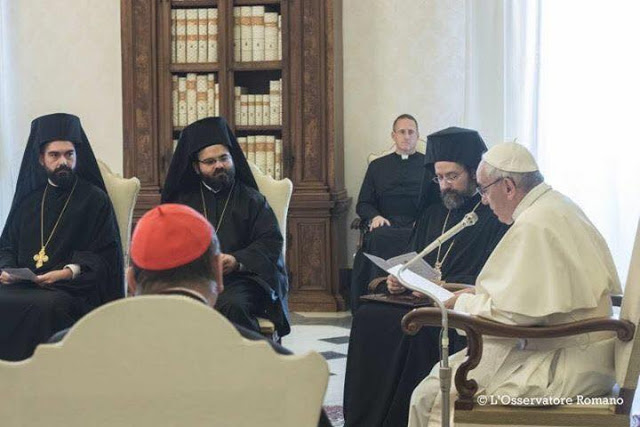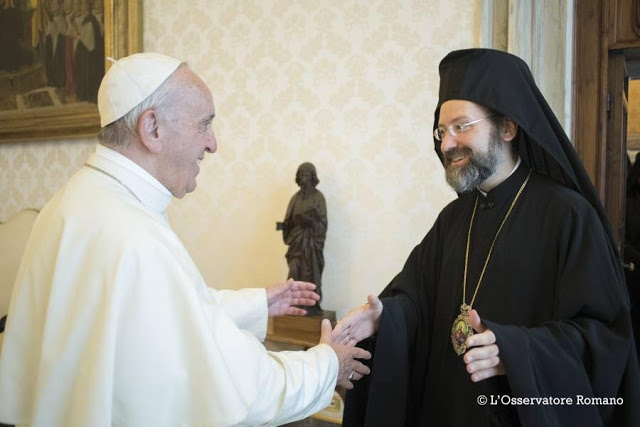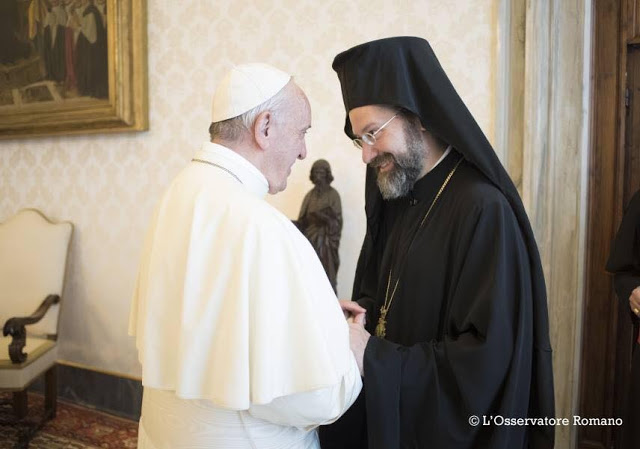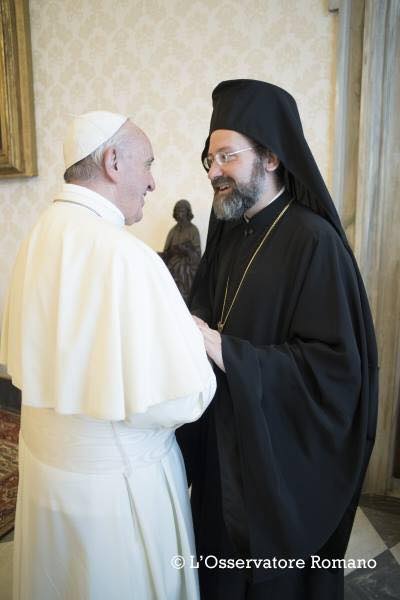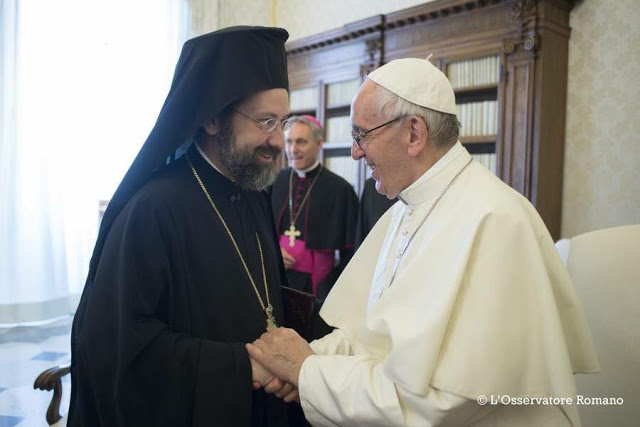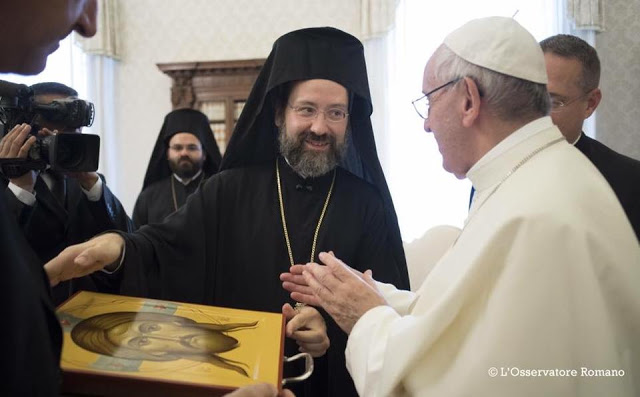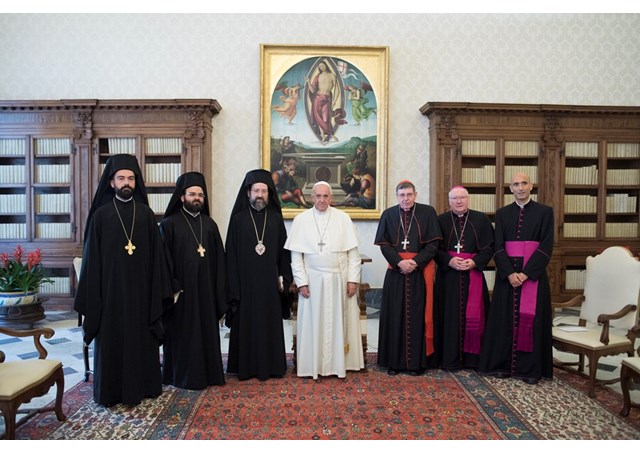
Ο Αρχιεπίσκοπος Τελμησσού Ιώβ διάβασε το παρακάτω γράμμα του Οικουμενικού Πατριάρχου Βαρθολομαίου προς τον Πάπα:
Your Holiness,
Today, we celebrate with you the honourable memory of the Holy, Glorious, and All-Praiseworthy Chiefs of the Apostles, Peter and Paul, who received their crown of martyrdom in the imperial city. We share in the joy of this feast by perpetuating the blessed tradition of exchanging official visits through delegations on the occasion of our respective Thronal Feasts. Our fraternal congratulatory wishes on this feast are conveyed to Your Holiness and expressed in person by our Patriarchal Delegation led by His Excellency Archbishop Job of Telmessos, co-president of the Joint International Commission for the Theological Dialogue between our two sister Churches, the Very Reverend Ambrosios Chorozidis, Grand Synkellus of the Ecumencial Patriarchate, and the Very Reverend Archimandrite Agathangelos Siskos, Librarian of the Ecumenical Patriarchate and secretary of our venerable delegation to you this year.
The commemoration of the Holy Apostles Peter and Paul reminds us of their common witness and ministry in the name of our Lord and Saviour Jesus Christ, which led them, ultimately, to their martyrdom. The Church was established on Christ, through the confession, witness and blood of the Holy Apostles, as our Lord foretold: “You shall receive power when the Holy Spirit has come upon you; and you shall be my witnesses in Jerusalem and in all Judea and Samaria and to the end of the earth” (Acts 1:8). Hence, after Saint Peter confessed Jesus Christ as the Messiah, the Son of the living God, our Lord said: “you are Peter, and on this rock I will build my church, and the powers of death shall not prevail against it” (Matt 16:18). For this same reason, Saint Paul spoke of his mission in these words: “To this day I have had the help that comes from God, and so I stand here testifying both to small and great, saying nothing but what the prophets and Moses said would come to pass: that the Christ must suffer, and that, by being the first to rise from the dead, he would proclaim light both to the people and to the Gentiles” (Acts 26:22-23).
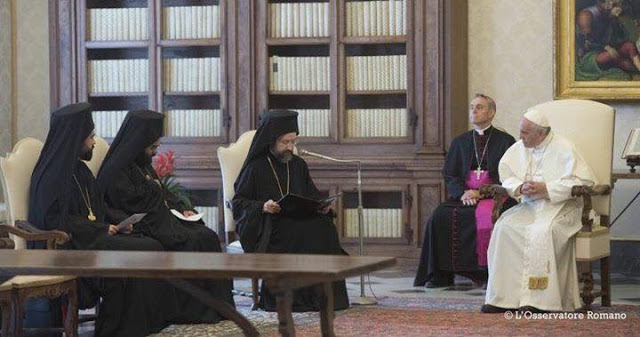
Tertullian recognized the blood of the Apostles and later of the Christian Martyrs as a seed for the Church. Addressing those who persecuted Christians, he said: “We spring up in greater numbers as often as we are mown down by you: the blood of the Christians is a source of new life” (Apologeticus, 50). The death of the martyrs is a testimony of Christ’s death on the Cross and a witness to His third-day, glorious Resurrection from the Tomb, both of which lead us to everlasting life in His Kingdom. For this reason, we celebrate the feast of the holy martyrs brightly with the joy of the Resurrection and in the joyful anticipation of the glory of the Kingdom to come, as witnessed by the first martyr, Archdeacon Stephen, at the moment of his martyrdom: “Behold, I see the heavens opened, and the Son of man standing at the right hand of God!” (Acts 7:56).
The Church, throughout her history, during different epochs and times, has been persecuted; however, the blood of her martyrs was a source of strength in faith and a witness of our Lord and Saviour Jesus Christ. As the Bride of Christ, the Church, is still called to martyria today, as it faces new forms of persecution and oppression. Over the last few years, we have witnessed with great sorrow the attacks targeting Christians and their places of worship. Our sister Churches stand in solidarity with all persecuted and oppressed Christians of our times, and at this very moment, we call to remembrance “those who are in mines, in exile, in harsh labour, and those in every kind of affliction, oppression, necessity, or distress”.
Today, we call to mind the joy we experienced being with Your Holiness in Egypt two months ago, a land which is continuously watered by the blood of Christian martyrs. We prayed with you for the people of Egypt, for unity, peace and justice in the world, in the church of Saints Peter and Paul in Cairo near Saint Mark’s Coptic Orthodox Cathedral, which became a few months ago a sacred martyrion.
This was a significant moment for us, and for the world. It was in Cairo that, together with Your Holiness, we addressed an International Conference on Peace, sharing together the conviction that there cannot be any violence nor justification of terrorism in the name of religion. Together with you, we underlined that violence is the negation of fundamental religious beliefs and doctrine, that true faith does not release humans from being responsible for the world, and emphasized the importance of respecting human dignity and the need for supporting struggles aiming to attain justice and peace. We reminded our contemporary world that humanity demands from religion today honesty and openness to cultivate love, solidarity and compassion. This can be achieved also through interreligious dialogue which has the aim of overcoming religious fundamentalism and demonstrating that religions can and should serve as bridges between people, as instruments of peace and mutual understanding and respect between human beings. This interreligious dialogue is further strengthened through the deeper rapprochement of divided Christians.
Therefore, we are convinced that our common witness before the numerous challenges of our contemporary world constitutes a positive testimony for the Church of Christ and for bringing us closer to unity. This is indeed the commandment of our Lord and Saviour: “By this all men will know that you are my disciples, if you have love for one another.” (John 13:35). Over fifty years ago, our sister Churches have engaged into a dialogue of love that has led us into a dialogue of truth. With this in mind, we place great emphasis on the theological dialogue being conducted for nearly forty years between our sister Churches. We were particularly pleased to learn that the fourteenth meeting of the Joint International Commission for Theological Dialogue, last September in Chieti, between our Churches was conducted in an atmosphere of fraternal collaboration and mutual theological exchange, successfully producing an important common document on primacy and synodality in the first millennium. Thus, this Commission has proposed new steps on our common path towards unity. Now, the Commission will be entering a new phase of the dialogue. It is our prayer that the Coordinating Committee scheduled for September on the island of Leros will be fruitful by producing a common theme and a methodology for the next stage of our discussions.
Your Holiness, dearest Brother Francis, as we celebrate today the Thronal Feast of the Church of Rome, we reiterate our deepest desire for our common advancement on the journey towards the unity. We pray that our Lord and Saviour Jesus Christ may grant you health, strength and peace, so that you may continue your diakonia to the precious souls entrusted to your primatial care and wisdom.
Conveying to Your Holiness, the venerable Hierarchs and the Christ-loving faithful of your Church, our warmest greetings, we embrace you fraternally with a “holy kiss” and remain with much love and honour in Christ Jesus, the Lamb once slain who lives forever.
At the Ecumenical Patriarchate, the twenty-ninth of June, 2017
Your Holiness’ beloved brother in Christ,
+ Bartholomew,
Archbishop of Constantinople-New Rome and Ecumenical Patriarch
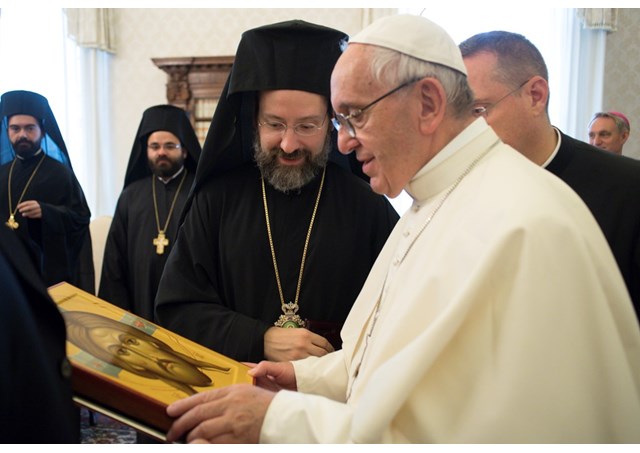
Ακολουθεί η προσφώνηση του Πάπα Φραγκίσκου προς την Αντιπροσωπεία του Οικουμενικού Πατριαρχείου.
Your Eminence,
